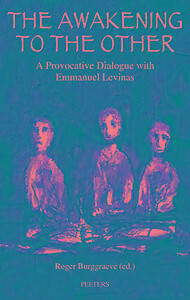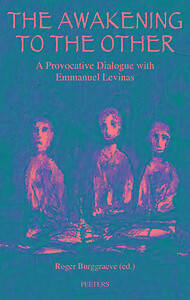
Bedankt voor het vertrouwen het afgelopen jaar! Om jou te bedanken bieden we GRATIS verzending (in België) aan op alles gedurende de hele maand januari.
- Afhalen na 1 uur in een winkel met voorraad
- In januari gratis thuislevering in België
- Ruim aanbod met 7 miljoen producten
Bedankt voor het vertrouwen het afgelopen jaar! Om jou te bedanken bieden we GRATIS verzending (in België) aan op alles gedurende de hele maand januari.
- Afhalen na 1 uur in een winkel met voorraad
- In januari gratis thuislevering in België
- Ruim aanbod met 7 miljoen producten
Zoeken
The Awakening to the Other
A Provocative Dialogue with Emmanuel Levinas
Roger Bruggraeve
Paperback | Engels
€ 78,95
+ 157 punten
Omschrijving
Levinas is a thinker for the future, concerned with the future. He inverts the priority of the declaration of the French Revolution "Freedom, Equality, Brotherhood", by designating "brotherhood" first among modern European society's most cherished values. Levinas sees brotherhood as the fundamental condition of our shared humanity and as the foundation of freedom and equality. Thus, he presents himself as a Western thinker who sets modern thought on its head and at the same time enriches it. His radical view of the other, responsibility, subjectivity and the Infinite remains a challenge, today more than ever. Calling out to both religious and secular seekers alike, Levinas asks for an alert and critical dialogue of the ethical and metaphysical meaning of our inter-human and social relationships. In this work, a new generation of philosophers, ethicists and theologians embark on a conversation with Levians, with due appreciation for his genius and uninhibitedness in their questioning. The intermediaries in this provocative dialogue are: Hannah Arendt, Henri Bergson, Anders Nygren, Paul Ricoeur and Hans Urs von Balthasar. The following themes are thus treated: - ethics as liberation and redemption beyond the self - time, duration and alterity - freedom, society and politics - desire between eros and agape - 'good enough' parenting and family ethics - conversational processes and pastoral counselling - asymmetry and reciprocity between the self and the other - modern humanism vs. post-modern anti-humanism as an inspiration for a renewed secular humanism - suffering, death and euthanasia - perspectives and boundaries of interreligious dialogue - the (im)possibility of a Christian interpretation of Levinas' Jewish-inspired thought - a new Christian theology of Trinitarian praxis. This volume likewise includes contributions by: Roger Burggraeve, W. Wolf Diedrich, Annemie Dillen, Thomas Folens, Glen Morrison, Marianne Moyaert, Marina Riemslagh, Anya Topolski, Emilie Van Daele, Jean Vanheessen, Sophie Veulemans and Torben Wolfs. In this book Levinas is presented as an 'extra-ordinary' other who awakes into vigilance the conscience of not only the contributors, but the readers as well: one speaks and the other responds differently.
Specificaties
Betrokkenen
- Auteur(s):
- Uitgeverij:
Inhoud
- Aantal bladzijden:
- 340
- Taal:
- Engels
Eigenschappen
- Productcode (EAN):
- 9789042920705
- Verschijningsdatum:
- 14/05/2008
- Uitvoering:
- Paperback
- Formaat:
- Trade paperback (VS)
- Afmetingen:
- 140 mm x 211 mm
- Gewicht:
- 453 g

Alleen bij Standaard Boekhandel
+ 157 punten op je klantenkaart van Standaard Boekhandel
Beoordelingen
We publiceren alleen reviews die voldoen aan de voorwaarden voor reviews. Bekijk onze voorwaarden voor reviews.









